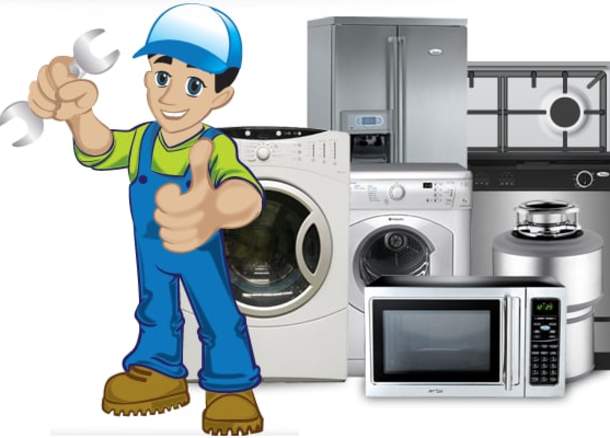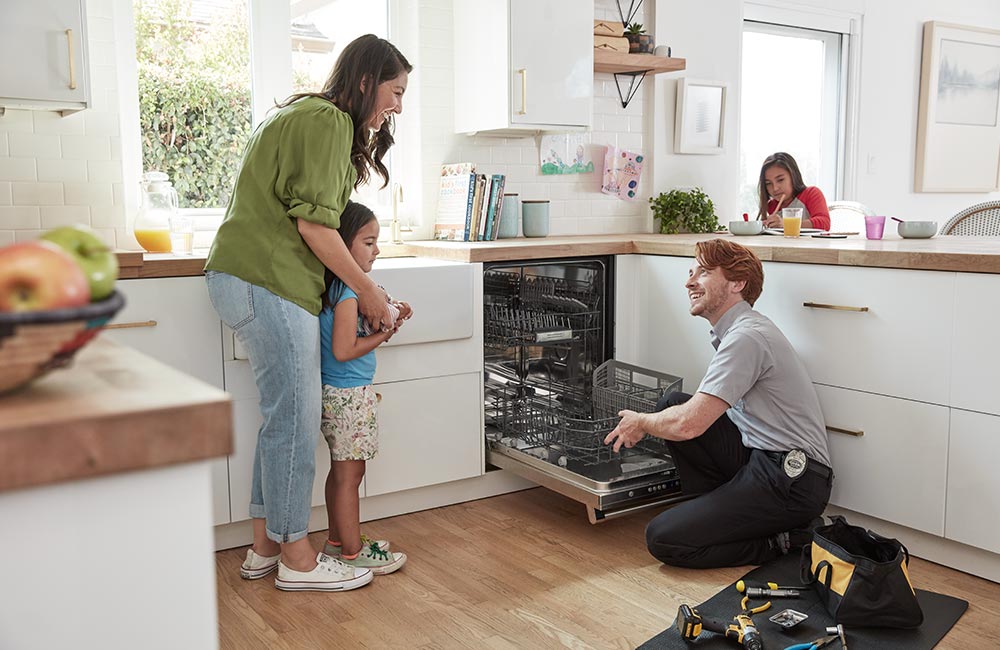The Ultimate Guide to Recognizing Appliance Fixing in your home
When your fridge quits cooling down or your stove declines to warm, it can feel frustrating. Understanding device fixing in the house can save you money and time. You'll learn to recognize signs, utilize necessary devices, and adhere to an organized troubleshooting procedure. Prior to you begin, there are crucial safety and security precautions you require to take into account. What are the most usual issues, and how can you fix them? Let's explore the essentials.
Common Device Troubles and Their Signs and symptoms
When your appliances begin acting up, it's necessary to recognize the indications beforehand. Neglecting them can bring about bigger problems and expensive repair services. If your refrigerator isn't cooling correctly, you might observe warm areas or condensation developing. This could show a stopping working compressor or a blocked vent.Your dishwashing machine may reveal troubles via dirty recipes or uncommon sounds during cycles. If you hear grinding or clanking, it's time to investigate.A washing machine that won't rotate or drain can leave you with soggy laundry, recommending a clogged up drainpipe or a malfunctioning pump.Lastly, if your oven's temperature seems off or it takes for life to preheat, you may be taking care of a defective thermostat. By remaining sharp to these signs, you can address issues prior to they rise right into major repairs.
Vital Tools for Home Appliance Fixing
When you're tackling device repair work in the house, having the right tools is important. Basic hand devices like screwdrivers and pliers will certainly assist you take apart and deal with numerous appliances, while electrical screening devices assure you're working safely with wiring. Allow's go over what you require to get going on your repair journey.
Basic Hand Devices
Having the right devices is essential for efficient home appliance fixing at home. Beginning with a trustworthy screwdriver set, including both flathead and Phillips types, as screws prevail in appliance assembly. Pliers are additionally important; they assist with gripping, twisting, and cutting cables or small elements. A set of needle-nose pliers can reach limited spots quickly. You'll require an excellent flexible wrench for tightening or loosening up nuts and screws. An utility knife is helpful for puncturing packaging or insulation. Don't forget a durable workbench or surface to safely organize your devices and parts. With these standard hand devices, you'll be well-prepared to tackle most appliance fixings that come your way.
Electrical Testing Tools
Along with standard hand devices, electrical screening devices play a necessary role in device repair work. These devices aid you detect electric problems and guarantee appliances work safely. A multimeter is important; it measures voltage, existing, and resistance, allowing you to pinpoint troubles quickly. A non-contact voltage tester is one more essential, letting you spot live cords without making direct contact, improving your safety and security. Clamp meters are wonderful for gauging present flow in cables without disconnecting them, conserving you effort and time. Additionally, circuit testers can promptly inspect if electrical outlets are working properly. By utilizing these devices, you'll improve your troubleshooting procedure and improve your repair skills, making device upkeep a great deal less complicated.
Step-by-Step Overview to Diagnosing Home Appliance Issues
When your appliance acts up, it can be aggravating, but detecting the concern doesn't need to be overwhelming. You'll discover to determine usual troubles and use efficient fixing strategies. Let's go through the steps to obtain your device back in working order.
Typical Home Appliance Issues

Fixing Techniques Explained

Repairing Major Kitchen Area Home Appliances: A Closer Look
Have you ever asked yourself just how to deal with common concerns with your kitchen home appliances? Repairing major kitchen home appliances like refrigerators, stoves, and dishwashers can be less complicated than you believe. Start by determining the issue-- whether it's a fridge not cooling or a stove that will not warm. Commonly, a basic reset or checking the power source can resolve the issue.For fridges, clean the condenser coils and inspect the door seals. If your stove's not home heating, evaluate the burner and thermostat. Dishwashing machines could just require a tidy filter or a reset to get them back at work. Always disconnect the device before diving right into repairs to ensure your safety.Don' t forget to consult the individual handbook for certain repairing suggestions connected to your model. With a little bit of patience and the right devices, you can confidently deal with device repair services and conserve money while doing so!

Fixing Washing Devices: Tips and Techniques
When your laundry home appliances begin breaking down, it can really feel frustrating, however repairing them doesn't have to be an inconvenience. Start by checking the power supply. Validate the home appliance is connected in and the outlet is working. Next off, inspect the door or cover switch; a damaged button can prevent the device from operating.For washers, if it's not spinning, look for out of balance lots. Rearranging the clothing may address the issue. If your dryer isn't heating, clean the dust filter and examine the vent for blockages.Listen for unusual sounds; they can indicate an issue. If your device is leaking, inspect the pipes for splits or loose links. File any kind of error codes shown on electronic screens, as they can direct hop over to these guys you in determining the issue. Ultimately, consult the individual guidebook for particular troubleshooting suggestions related to your version.
Safety And Security Preventative Measures to Take Throughout Repairs
Before you start any kind of appliance repair work, it's important to focus on safety to avoid mishaps or injuries. Unplug the home appliance or turn off the circuit breaker to assure no power reaches it while you function. Usage protected tools to minimize the risk of electrical shock. Wear security goggles and gloves to secure yourself from sharp sides or debris (Lg Dryer repair near me Dependable Refrigeration & Appliance Repair Service).Make certain your office is tidy and well-lit, so you can see what you're doing. Keep kids and pet dogs away from the location to avoid disturbances and prospective threats. If you're managing gas home appliances, be added careful; look for leaks prior to proceeding.Take your time, and do not rush via repairs. If you really feel unpredictable regarding any step, it's far better to pause and research study than to guess. Adhering to these safety measures will certainly help develop a much safer setting for your DIY home appliance repair work task
When to Call an Expert for Help
Just how do you understand if it's time to call a professional for device repair services? If you've tried standard troubleshooting without success, it's a clear indication. As an example, if your appliance still will not start or reveals unusual sounds after resetting it, do not wait to look for professional help.When you notice leaks, smoke, or shedding smells, prioritize safety and call a pro quickly. These issues can bring about more significant damage or pose risks to visit your home.Also, if your appliance is under warranty, getting in touch with an expert is often the most effective path. They can ensure that repair services will not nullify your guarantee, saving you money in the long run.Finally, if you're uncertain or unpleasant with complicated fixings, it's a good idea to leave it to the experts. Keep in mind, dealing with challenging problems without the ideal competence can bring about costly mistakes. Trust fund a specialist when doubtful!
Frequently Asked Inquiries
Just How Can I Stop Appliance Troubles in the Future?
To stop appliance troubles in the future, you must perform normal upkeep, check for damage, clean filters, and avoid overloading. Remaining positive will aid extend their life-span and keep them running efficiently.
What Are one of the most Common Do It Yourself Home Appliance Repair Mistakes?
You might forget security precautions, skip fixing actions, or use inaccurate tools when trying appliance repair near you DIY device repair services. Rushing the process or overlooking maker standards can lead to more considerable problems and pricey blunders. Keep individual and educated!
Just how Do I Know if a Component Needs Substitute?
You can inform if a part needs substitute by looking for unusual noises, leaks, or irregular efficiency. If the appliance has a hard time to run appropriately or reveals visible damage, it's most likely time for a substitute.
Can I Use Generic Components for Device Repair Works?
Yes, you can utilize common parts for device repairs, however determine they work - Dryer repair Oro Valley Dependable Refrigeration & Appliance Repair Service. Common components might save you cash, yet they could affect performance or long life, so weigh your choices thoroughly prior to choosing
What Warranties Cover Appliance Repairs?
A lot of home appliance service warranties cover repairs for manufacturing flaws, yet they often omit damages from misuse. Check your guarantee terms meticulously, as some might require making use of certified service technicians and initial parts for insurance coverage to continue to be valid.